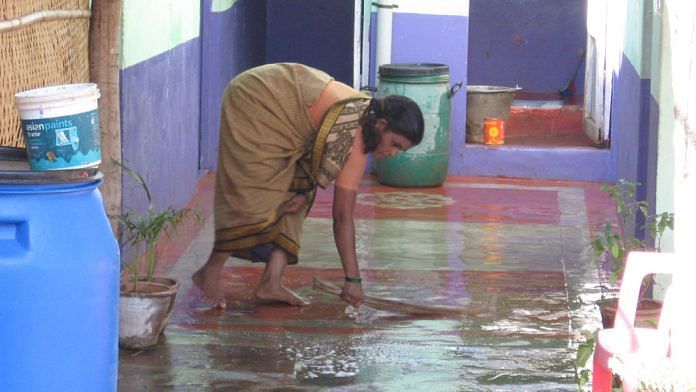The Modi government’s new labour code would include domestic workers. But, with the general election coming up in 2019, it is not likely that BJP will be willing to push through such a major change.
A picture on Twitter of a domestic worker sitting on the Metro floor while her employer and her child sat on the seat in a sparsely filled Metro carriage has momentarily started a conversation about how domestic workers are treated. This is a rare event. Domestic workers — housekeepers, nannies, cleaners, cooks, maids — whatever they are called by society, are mostly invisible.
Unlike other jobs, domestic work is not even recognised as work by the government. Working conditions for domestic workers are entirely unregulated. There is no employment contract or set wages. There are no rules regarding hours of work or leave. And of course, there is nothing at all that defines what work a domestic worker can be asked to do. Quite simply, domestic workers, the majority of them women, are not recognised as workers and are outside the legal system.
The government of India has been unwilling to ratify the ILO Convention 189 on Decent Work for Domestic Workers. It has also been less than keen to create a national law to regulate domestic work.
In October 2017, the BJP government made public a new Draft National Policy for Domestic Workers. The draft policy gives domestic workers the right to equal and minimum wages, mandatory leave, social security cover, access to skill development programmes and the right to association/forming unions on a par with all other workers under existing labour laws. The Draft National Policy is ambivalent on whether there should be a new law for domestic workers or whether to amend the existing core labour laws to include domestic workers (such as Industrial Dispute Act, Payment of Wage Act, Workmen’s Compensation Act). There is no clear time frame set out for bringing in either a new law or the amendments to existing laws.
This lack of clarity in a policy document is a reflection of the government’s apathy to domestic workers. It creates the impression that statutory protection is within our grasp. But, that would be wishful thinking. A draft national policy that is not backed by a law is toothless, much like the policies brought during the UPA regime.
The government has also not made any budgetary provision to create the relevant infrastructure to implement the law. Nonetheless, the draft policy is a step forward. However, after an initial discussion on the draft policy, it has disappeared from the agenda.
The Modi government has made clear that it has a larger agenda to streamline all labour laws into four labour codes. The new labour code would include domestic workers. But, the rationalisation of 44 labour laws into four labour codes is being vehemently opposed by all central trade unions and with the general election coming up in 2019, it is not likely that BJP will be willing to push through such a major change.
The experience of state governments which have instituted a minimum wage for domestic workers does not give hope. The governments of Rajasthan and Jharkhand are two states which, in principle, have a minimum wage. Their announcements raised expectations which were dashed the instant the guidelines were published. Rajasthan, for example, set the wage at Rs. 5642 per month for live-in domestic workers and Rs. 705 as a monthly wage for one hour a day for part-time workers. The wage was not just low, but much lower than what domestic workers were already earning. The Rajasthan government’s move was counter-productive as workers felt their jobs were hugely under-valued by the minimum wage order. Other states, for example Tamil Nadu, have systematically stalled the process of fixing a minimum wage as unions like ours have been insistent on a higher wage band, which would also require greater effort by the government to ensure employer compliance.
For domestic workers, this means going back to square one — becoming invisible and remaining outside the purview of law. With the uncertainties and lack of clarity, clubbing statutory measures for domestic workers within the larger plan of the four labour codes is pushing back domestic workers demands.
The very urgent need of domestic workers to be brought under statutory protection cannot and should not be put on the back-burner while the larger questions of labour legislation are being discussed.
Every once in a while, the media reports cases of mistreatment, violence or murder of a domestic worker. Like the Twitter picture, this create momentary interest. However, the problem runs much deeper. Working conditions and pay are one set of issues that must be addressed. There is also the far less acknowledged issue of trafficking of women and their effective enslavement as domestic workers. None of this will change unless governments are willing to treat domestic workers as workers.
NSSO data in 2011 put the figure of domestic workers at 3.9 million. While this is an increase of 120 per cent over the preceding decade, trade unions have said that it appears to be a gross underestimation, if one goes by the size and number of middle class households, which is about 12 million by the 2011 census. In India, anyone with a minimum ability to pay for domestic work employs them. Yet, the people who clean our homes, cook our food and care for our children are not considered worthy of the protection of law.
There needs to be a comprehensive and time-bound decision on the Draft National Policy of Domestic Workers and it needs to be dealt with an immediacy that is profoundly lacking when it comes to dealing with the issues of the informalised and dispersed domestic workers.
Sujata Mody has mobilised and unionised domestic workers in some districts in Tamil Nadu. She is President, Penn Thozhilalargal Sangam and National Secretary New Trade Union Initiative.



